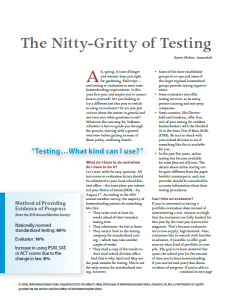Evidence of Progress - Standardized Testing
The March-May 2018 issue of VaHomeschoolers Voice magazine contains the article entitled “The Nitty-Gritty of Testing” to answer many of your questions about the standardized testing option for showing evidence of progress.
What Test Can I Use?
Any nationally normed standardized test can be used to satisfy the evidence of progress requirements.
A nationally normed standardized test is a test that has been given to large numbers of students at specific grade levels and whose scores make up the norms which make it possible to compare students. Examples of nationally normed standardized tests include the California Achievement Test (CAT), the Iowa Test (ITBS), and the Stanford Achievement Test (also known as the Stanford 10).
Which test you decide to use will depend on your goals for the testing. Do you just want to test to satisfy the state’s requirements? Do you want to test to identify the strengths and weaknesses of your child?
If you have questions about which test to use, it is best to check with individual test providers for the most accurate information. For a list of test providers, see Test Providers and Evaluators. Note: Inclusion on this list does not constitute an endorsement from VaHomeschoolers.
Option (i) of the Home Instruction Statute (§22.1-254.1 C) provides an objective means of meeting the evidence of progress requirement.
A composite score in or above the 4th stanine (24th percentile) on any nationally normed standardized test must be accepted as evidence of progress by the Superintendent. To read the complete text of the law:
Frequently Asked Questions
What subjects do I need to test?
The law does not define which subjects must be covered in the evidence of progress. Some nationally normed achievement tests cover only math and language arts, while others include additional subjects. Parents may choose the test that is best for their child, as long as it is a nationally normed achievement test.
What grade level test do I choose?
It depends on the test provider that you use. Some ask you to purchase the test for the grade level your student just completed and others ask you to purchase the test for the grade level your student is going into. Please read the directions for purchase closely or contact the provider directly to clarify.
Where and how do I test?
Where and how you test depends on the publisher or the test provider. Each has its own rules. Some providers allow the parent to administer the test in their home. Others require an independent administrator. It is best to check with the test provider to find out the requirements.
A few Virginia school divisions offer Stanford 10 testing to homeschoolers at some or all grade levels. Testing through the school is free and is often offered in the spring (March or April). Scores will be sent directly to the school rather than to the parent.
My child experiences test-taking anxiety; are there any untimed standardized test options?
The vast majority of achievement tests (the CAT, TerraNova, ITBS, as well as the PSAT, SAT, and ACT) are timed. Without a standardized amount of time for all students to complete a test section, the test would not be standardized and the norming would be compromised, thus skewing the results for all.
The Stanford 10 was designed as an untimed test and be taken online, by any homeschooled student, through Seton Testing Services as well as a few other providers.
How does my child take the Virginia SOLs?
Homeschooled children do not take SOL exams, unless they are enrolled in a public school class that requires it. SOLs are not nationally normed and are not acceptable as evidence of progress for homeschooled students.
When can I test?
A parent may test or have a child tested at any time during the school year, so long as the results are submitted by August 1st. Most parents test in the spring or early summer.
When determining when to test, keep in mind the option of finding a different method of evaluation if the test you have chosen turns out to be a poor indicator of your child’s abilities.
Remember to allow adequate time for sending tests and test results through the mail, though some school divisions do permit results to be sent electronically.
Can my child receive accommodations for special needs?
Accommodations are defined by the publisher or test provider and it is best to contact them to find out the details. Usually, you will be required to show a letter from a doctor or school specifying the child’s disability. Contact your test provider for complete details on complying and specifics on the accommodations permitted.
Read “Attaining Testing Accommodations for Your Child with Special Needs” for further information.
Two things to keep in mind when testing if your child has special needs or a learning disability: the statute requires progress, not mastery, and there is no legal requirement that a child be “at grade level.”
If your child does not test well, you may want to consider using an alternate form of evaluation. For more information on additional evaluation options, see Evidence of Progress Option (ii): Evaluation or Assessment.
Which scores need to be submitted?
The home instruction statute indicates that you are supposed to submit “a composite score in or above the fourth stanine or the 23rd percentile.”
Most reports from testing services provide a breakdown of scores by stanine in each of the subject areas. Even if your child has a subject score lower than than the 4th stanine, they are still fine, as long as the composite score is in or above the 4th.
Please do not black out any individual scores that appear on your child’s results before submitting the scores to your school division. This is not necessary and can look suspicious because it alters an official test document. If you do not wish to submit individual subject-area scores, some test providers will supply a composite-only score sheet at your request.
What is a stanine, percentile, or norm?
For an explanation of testing terminology, see Interpreting Test Scores and What the *Bleep* is a Stanine?
Can I submit my child's SAT or ACT scores as evidence of progress?
Yes. School divisions accept scores from the PSAT 8/9, PSAT 10, PSAT NMSQT, SAT, or ACT as valid evidence of progress.
This information is provided as a courtesy of The Organization of Virginia Homeschoolers. It is not intended as legal advice. For legal advice, contact a licensed attorney.
VaHomeschoolers is a non-profit public charity with 501(c)(3) status; your donation is tax-deductible to the extent provided by law.

